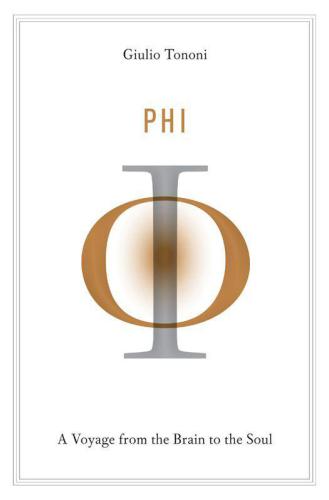
Phi
A Voyage from the Brain to the Soul
کتاب های مرتبط
- اطلاعات
- نقد و بررسی
- دیدگاه کاربران
نقد و بررسی

Starred review from May 14, 2012
Both playful and philosophical, this extravagant book addresses questions about the root of consciousness in a unique way to illustrate Tononi’s innovative view of consciousness in terms of information theory, the brain as an integrated network of signals. Professor of neuroscience at the University of Wisconsin, Tononi takes an aging Galileo—and the reader—on a complex intellectual journey in three parts, each led by a prominent scientist. Francis Crick, co-discoverer of the structure of DNA, shows Galileo how various portions of the human brain function, both separately and together. Alan Turing, a founder of the science of artificial intelligence, helps Galileo understand how to link these facts into “a scientific theory of consciousness.” Galileo’s third guide is Charles Darwin, who explores how consciousness is evolving. Tononi provides notes at the end of each chapter that expand on the themes raised, and in a voice separate from that of the text’s narrator; for example, the book ends with an arcane symbol, and the note comments that this symbol “must hold some great significance to the author but could not be deciphered.” The book is a visual delight as well as an impressive read, its lavish artwork and literary references demonstrating just how fully complementary art and science can be.

June 15, 2012
Neuroscientist and psychiatrist Tononi (Consciousness Science/Univ. of Wisconsin; co-author: A Universe of Consciousness: How Matter Becomes Imagination, 2000) offers an original, provocative tale of a scientist's quest to understand how the brain generates consciousness. The scientist is the aging "father of science" Galileo, who sets out in the company of three others (Francis Crick, Alan Turing and Charles Darwin) to investigate all aspects of consciousness: what it is, how it can be measured, why it fades during dreamless sleep but returns when we dream, and how the known facts can form a theory of consciousness. The theory is Tononi's integrated information theory (IIT) of consciousness, which, as he notes in the preface, he describes scientifically in his paper "Consciousness as Integrated Information." This book takes Galileo--and readers--step by step through the development of the theory, now widely viewed as a promising fundamental theory of consciousness. During the course of his imagined journey of discovery, Galileo has lengthy conversations with his guides, hears accounts of what's involved--or not--in consciousness and sees innumerable paintings, photographs, drawings and other images from over the centuries (all reproduced here) that help elucidate aspects of the lessons. There are intriguing discussions of whether consciousness exists in the split brain, during seizures, in dementia and other states. Tononi playfully draws us deeply into the wondrous adventure of understanding consciousness and the critical role of integrated information in shaping our experience in the world. With Galileo, we learn that each moment of awareness is a unique and unified experience unlike others before or after it. Indeed, consciousness--the flow of integrated information--can be expressed in a set of mathematical equations. A challenging, rewarding read that will undoubtedly alter your consciousness.
COPYRIGHT(2012) Kirkus Reviews, ALL RIGHTS RESERVED.

August 1, 2012
Tononi (psychiatry; Univ. of Wisconsin; coauthor, with Gerald Edelman, A Universe of Consciousness: How Matter Becomes Imagination) here explores the concept of consciousness, using allegories for the isolated and integrated functions of each brain region. The narrative imagines Galileo on his deathbed, experiencing revelations about the nature of consciousness as he interacts with scientists including Francis Crick, Alan Turing, and Charles Darwin. Some scenes--such as the "Tale of Two Cities" fable, which contrasts the functions of the cerebral cortex and the cerebellum--effectively illustrate the integrated ("phi") nature of consciousness. Tononi offers a distinct means of framing consciousness that emphasizes holistic unity; other books, such asDaniel C. Dennett's Consciousness Explained present competing theories. This book will be of interest to those looking for a philosophical exploration of consciousness grounded in science. VERDICT To more literal-minded thinkers, this book may be a bit too abstract and complex in its examination of neuroscientific concepts. However, it will take on a unique journey those looking for a balanced blend of the literary, philosophical, and scientific.--Ryan Nayler, Univ. of Toronto Lib.
Copyright 2012 Library Journal, LLC Used with permission.

























دیدگاه کاربران